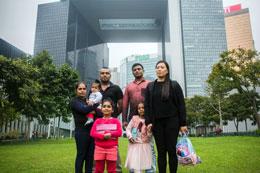Snowden protectors seeking Canada asylum

Three families who helped shelter former U.S. National Security Agency contractor Edward Snowden in Hong Kong in 2013 after his mass leak of information about surveillance programs have asked Canada for asylum, their lawyer said on Friday.
The families - three Sri Lankan adults, a Filipina, and three stateless children - have had long-pending asylum claims in Hong Kong that they fear may soon be rejected, lawyer Marc-Andre Seguin said in a phone interview from Hong Kong.
Vanessa Rodel from the Philippines, who has a five-year-old daughter and is one of those seeking asylum in Canada, has said she has no regrets about taking Snowden in.
"I am hopeful that we can get into Canada and start a new life (with) safety and freedom," she told Agene France-Presse.
Seguin said the families had been thrust into the spotlight after the September release of the Oliver Stone film "Snowden" which referred to their role in Snowden's flight from the United States in 2013 and, eventually, to Russia.
Seguin said the families and Hong Kong-based lawyer Robert Tibbo, who introduced his clients to Snowden, now face increasingly adverse circumstances in Hong Kong.
They said that they have been "actively sought by Sri Lankan operatives" in recent months and fear for their safety in Hong Kong, Seguin said. Reuters could not independently verify their stories.
A spokeswoman for Canada's immigration minister said his office does not comment on current or possible cases and could not confirm or deny having received the applications.
Hong Kong authorities have yet to confirm that they are investigating claims Sri Lankan operatives were working in the territory, but a Security Bureau spokesman said it was illegal for foreign agencies to carry out law enforcement action within Hong Kong.
"Everyone in Hong Kong is protected by Hong Kong laws regardless of his or her identity and background," the bureau spokesman said.
Snowden's leaks of classified information about government surveillance programs caused an international furor over the reach of U.S. spy operations. His defenders see him as a whistleblower who exposed the extent of government snooping on citizens.
He has been allowed to remain in Russia for another three years and will next year qualify to apply for Russian citizenship, his Russian lawyer was quoted as saying in January.






